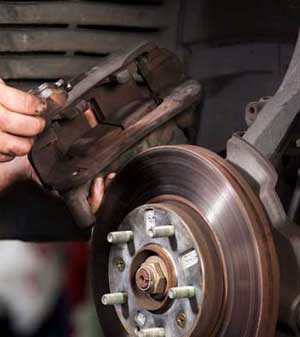
Your car's brakes are vital to safety. There can be no compromise when it comes to your ability to stop your car when it is in motion. In an emergency situation, the difference of a few metres can be vital. It is, therefore, extremely important that you have your brakes serviced regularly, and parts replaced and adjusted if required.
What are brakes and how do they work?
Brakes are mechanical devices that apply pressure to the wheel assembly of your car, creating friction, and therefore retarding motion. Brakes are especially subject to wear and tear because creating friction, in turn makes heat. Any working part subjected to intense heat over a period of time will suffer considerable deterioration. Most car brakes fall into two categories, drum and disc brakes. In both cases brakes pads' or shoes' are forced against a disc or drum, attached to the wheel assembly. By applying pressure they create friction, and in turn slow the vehicle's movement.
It's fair to say that your brakes are the most important function of your vehicle.
When they're working as they should, they keep you, your passengers, other motorists, and pedestrians safe.
But, brake problems are aplenty: squeaky, shaky, wobbling, grinding, spongy, bouncing, and pulling brakes are all relatively common in the auto world.
Many brake issues start off as quite minor and would be very easy for a professional to fix.
However, if these minor problems aren't dealt with early, they can soon turn into bigger, more dangerous braking complications that can put you and others at risk on the road.
That's where car brake maintenance comes in.
With regular checks and servicing you can keep your car running safely and effectively on the road.
How do you spot potential brake problems?

All drivers should practise some awareness of their vehicles. When you drive you should always be aware of things like unfamiliar noises and any changes to how the car handles or behaves on the road. In terms of brakes there are several things to look out for, which may indicate problems. They include:
- Pulling to one side or another when you brake. If you apply the brakes and the car veers to the left or right, it may indicate a brake issue.
- Do you have to apply more or less pressure to the brake pedal, compared to normal?
- Do the brakes 'grab' with only a little pedal pressure?
- Brakes that appear to stick, hot wheels or an apparent loss of engine power may be another sign.
- Excessive squealing or other unfamiliar sounds when you apply brakes.
- Is the pedal too high or too low, compared to normal, when the brakes take effect?
- Unusual vibrations when you apply the brakes is another sure sign.
- If your car has a brake light and it lights up, make sure you seek a mechanic's advice immediately.
In short, if there is anything different to normal in the way your car feels, handles or sounds when you apply the brakes, get an expert to take a look straight away.
Brake troubles? Book in a Vehicle Service at JAX Tyres & Auto!
There’s no one single answer for how long car brakes actually last. That’s because it is different for every driver depending on their driving style, where they drive, the weight the car carries, and a myriad of other factors.
You can extend the life of your brakes with regular servicing and brake maintenance. This keeps them working as best as they can and ensures any minor issues are resolved before they cause damage that requires replacement of bigger system components.
When it comes to braking it’s particularly important to pay attention to any unfamiliar noises or changes in how the car handles or behaves on the road.
Some common signs of a brake problem include:
- Pulling to one side when you brake. If you apply the brakes and the car veers to the left or right, it may indicate a brake issue.
- If you have to apply more or less pressure to the brake pedal compared to normal.
- The brakes grab with only a little pedal pressure.
- Brakes that appear to stick.
- Excessive squealing or other unfamiliar sounds when you apply brakes.
- The pedal feels too high or low compared to normal when the brakes take effect.
- Unusual vibrations when you apply the brakes.
- The brake light is on.
If you ever notice any signs of bad brakes, get them checked by a professional immediately.
“In the case of an emergency, the difference of just a couple of metres can be the difference between life and death. For this reason, regular car brake maintenance is essential.”
Brakes are absolutely critical to road safety for you and others. In the case of an emergency, the difference of just a couple of metres can be the difference between life and death. For this reason, regular car brake maintenance is essential.
Your car's manufacturer will have specified recommended service intervals for your car. This is usually every 6 months or to a set number of kilometres.
Make sure you stick to this schedule and ensure you only get work done by a suitably qualified mechanic.
Always make sure your brakes are checked and a full report given. Regular adjustment can save you money and optimise safety.
The peace of mind that comes with effective brakes is worth the time, effort and minimal expense of regular servicing.
Your hydraulic brake system uses pressure between your brakes and your tyres to slow the wheel. If this pressure is reduced due to a fault in the braking system, the brakes won't be able to work correctly.
Some of the causes are:
- Air in the brake line: The hydraulic pressure usually is evenly distributed to make your vehicle stop. If there is air in the lines, it can create a pressure imbalance leading to an increased stopping distance.
- Break line damage: There can be several reasons for brake line damage. Sometimes it can be due to rust from the salt and moisture on the road.
- Brake fluid loss: Brake fluid is necessary to convert the energy from pressing the brake pedal into force to stop the car. A leak reduces the brake fluid resulting in less pressure.
- Damaged disc brake caliper: The resulting heat needed to come to a complete stop can cause damage to your vehicle's disc brake calipers.
The simple answer is yes.
When you install new tyres onto your vehicle, you should have better performance than your old tyres. Tyres play their part in effective braking by aiding the stability and how quickly you come to a stop by providing more grip.
However, while new tyres will affect the braking system's effectiveness, the two are separate components of your car. You can't stop unless your braking system is working the way it should, as the two have equal bearing on the safety and handling of your car.
So, depending on the problem you are trying to fix will ultimately depend on whether you still have braking problems after new tyres.
If you're concerned about your vehicle stopping abilities, chat to your local JAX representative to determine what's preventing your car from driving smoothly and safely.
A spongy brake happens when the pressure leaks out and no longer properly goes through the brake pistons.
There are three symptoms of spongy brakes:
- Your brake pedal keeps sinking: When the vehicle can't hold brake pressure properly, your brake pedal will sink with no resistance when you press down on it.
- Your brake warning lights are on: Most modern vehicles have a built-in dashboard indicator light that notifies you when the brake system is compromised.
- Your pedal requires pumping to keep your vehicle from moving forward: If you need to repeatedly pump the brakes to bring your car to a stop, check your brake system for a fluid leak.
For your brakes to work correctly, several components must work together. If one of these components is worn down or damaged, it can lead to brake failure.
Some of the causes of brake failure are:
- Loss of hydraulic brake fluid pressure: If there is a leak in the brake lines, the brake fluid will slowly drain out until it drops too low to transmit pressure between the pedal and the tyres.
- Discs or drums wear out: If this happens, there will no longer be enough friction on the wheels to slow them to a stop.
- Overheating brake pads: Brake pads can become hard and brittle due to excessive heat. The pads cannot correctly grip the wheel rotor disc or drum if hardened.
- Loss of hydraulic fluid: Oil or other hydraulic fluid can leak from your car engine or brake lines. If you are finding issues with stopping, check your brakes for contamination.
- Overloading your vehicle: Overloading your car can potentially damage the braking system.
- Owners neglect: Like most car parts, the brake system has a limited lifespan and should be inspected for natural wear and tear.
There are many reasons why your brakes may be grinding:
- Lack of brake pads: The brake pads wear, leaving metal grinding against metal and can be heard when you stop or slow down.
- Brake disk and the calliper rub together: You'll usually hear a sharp grinding sound as you brake or feel the brake pedal rumble as you step on it.
- Stuck rocks or debris: You may hear grinding when driving at a constant speed due to debris lodged between the calliper and the rotor.
- Anti-Lock Braking System (ABS): In a situation where you suddenly slam on the brakes, the ABS will automatically activate to prevent your wheels from locking up and skidding. The grinding should stop once you take your foot off the pedal.
To ensure you are driving safely on the roads, we recommend you get your vehicle checked out by a professional if you notice anything unusual or have any safety concerns.
We all hope the day never happens when we drive down the highway, and our brakes fail on us. But, if it was to happen, follow these steps and remember to stay calm:
- Take your foot off the gas.
- Turn on the hazard lights: If you have time, putting on your hazard lights or using your horn can warn the people around you that something is wrong. Even if they don't fully understand the issue, it'll make them more aware of you.
- Downshift (slowly): Turn off cruise control (if applicable) and gradually downshift to decrease momentum.
- Pump the brake pedal hard and fast: Nowadays, most modern vehicles have a dual braking system for the front and back brakes that work independently. Pumping the brakes may be enough to engage half of the brakes to help slow you down to a stop. This will only work if one half of the dual braking system is still working.
- Apply emergency brake (cautiously): The emergency brake will not bring you to a grinding halt, but it will slow you down dramatically. Be sure you don't do it too abruptly and remain in complete control.
- Steer yourself to safety: As the vehicle begins to stop, steer yourself to the side of the road to get out of the way of oncoming traffic and remove you and your passengers from further harm.

